Self-Leadership Theories: Comparing Social Cognitive & Motivation
VerifiedAdded on 2022/08/30
|8
|1877
|39
Essay
AI Summary
This essay delves into the concept of self-leadership, exploring how individuals can develop themselves to thrive in a complex world. It begins by defining self-leadership and then contrasts two key psychological theories that underpin it: social cognitive theory and intrinsic motivation theory. The essay examines the core principles of each theory, including how they influence self-efficacy, the belief in one's ability to succeed. The paper then provides a detailed comparison and contrast of these theories, discussing how they explain the sources of motivation and goal attainment. The essay also explores the construct of self-efficacy, examining how it is viewed within both theoretical frameworks. In the second part, the essay discusses the author's personal sources of self-efficacy and draws upon the example of J.K. Rowling's journey to illustrate the application of self-leadership principles. The conclusion summarizes the key differences between the theories and highlights the importance of self-leadership in achieving personal and professional goals.

Running head: SELF-LEADERSHIP
1
Self-Leadership
Name
Institution
1
Self-Leadership
Name
Institution
Paraphrase This Document
Need a fresh take? Get an instant paraphrase of this document with our AI Paraphraser
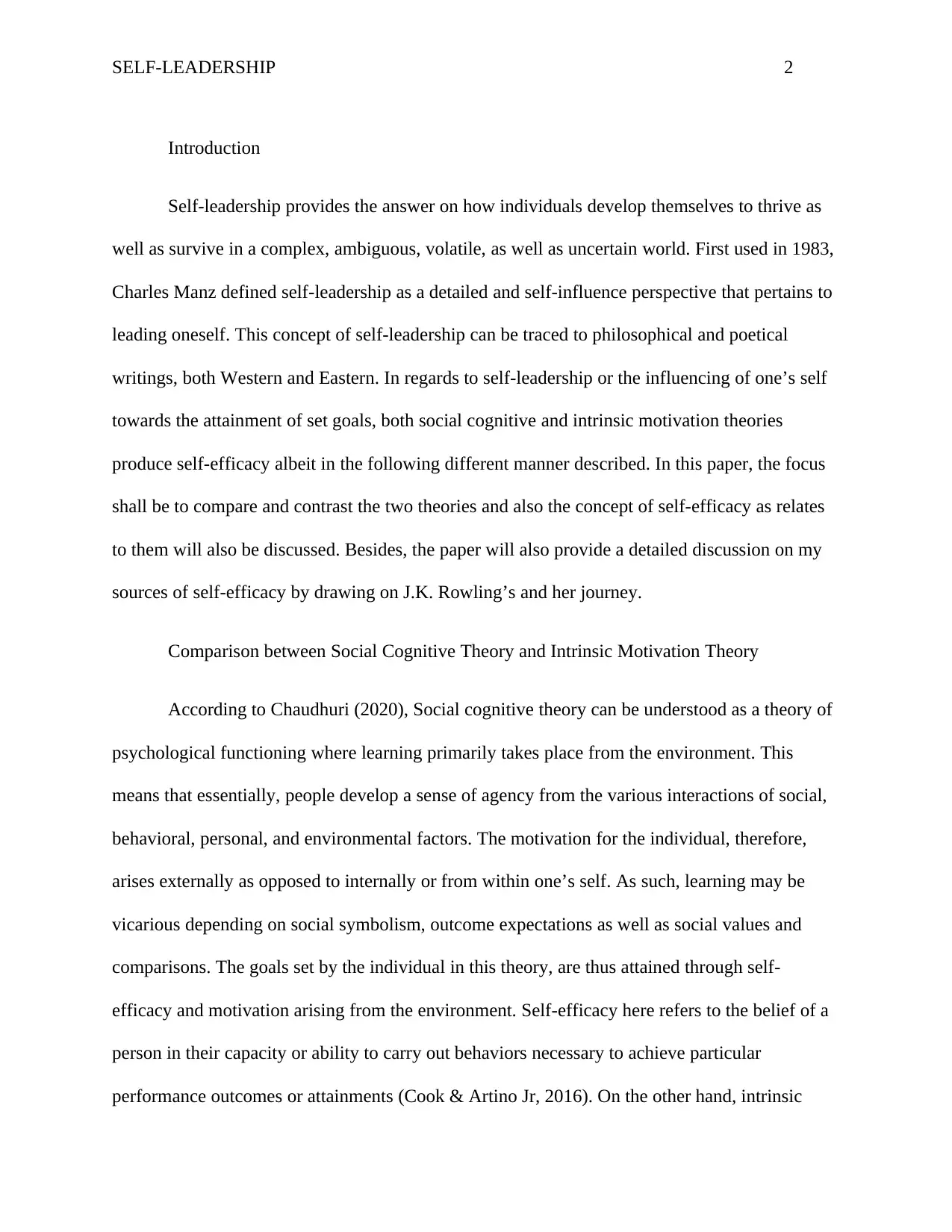
SELF-LEADERSHIP 2
Introduction
Self-leadership provides the answer on how individuals develop themselves to thrive as
well as survive in a complex, ambiguous, volatile, as well as uncertain world. First used in 1983,
Charles Manz defined self-leadership as a detailed and self-influence perspective that pertains to
leading oneself. This concept of self-leadership can be traced to philosophical and poetical
writings, both Western and Eastern. In regards to self-leadership or the influencing of one’s self
towards the attainment of set goals, both social cognitive and intrinsic motivation theories
produce self-efficacy albeit in the following different manner described. In this paper, the focus
shall be to compare and contrast the two theories and also the concept of self-efficacy as relates
to them will also be discussed. Besides, the paper will also provide a detailed discussion on my
sources of self-efficacy by drawing on J.K. Rowling’s and her journey.
Comparison between Social Cognitive Theory and Intrinsic Motivation Theory
According to Chaudhuri (2020), Social cognitive theory can be understood as a theory of
psychological functioning where learning primarily takes place from the environment. This
means that essentially, people develop a sense of agency from the various interactions of social,
behavioral, personal, and environmental factors. The motivation for the individual, therefore,
arises externally as opposed to internally or from within one’s self. As such, learning may be
vicarious depending on social symbolism, outcome expectations as well as social values and
comparisons. The goals set by the individual in this theory, are thus attained through self-
efficacy and motivation arising from the environment. Self-efficacy here refers to the belief of a
person in their capacity or ability to carry out behaviors necessary to achieve particular
performance outcomes or attainments (Cook & Artino Jr, 2016). On the other hand, intrinsic
Introduction
Self-leadership provides the answer on how individuals develop themselves to thrive as
well as survive in a complex, ambiguous, volatile, as well as uncertain world. First used in 1983,
Charles Manz defined self-leadership as a detailed and self-influence perspective that pertains to
leading oneself. This concept of self-leadership can be traced to philosophical and poetical
writings, both Western and Eastern. In regards to self-leadership or the influencing of one’s self
towards the attainment of set goals, both social cognitive and intrinsic motivation theories
produce self-efficacy albeit in the following different manner described. In this paper, the focus
shall be to compare and contrast the two theories and also the concept of self-efficacy as relates
to them will also be discussed. Besides, the paper will also provide a detailed discussion on my
sources of self-efficacy by drawing on J.K. Rowling’s and her journey.
Comparison between Social Cognitive Theory and Intrinsic Motivation Theory
According to Chaudhuri (2020), Social cognitive theory can be understood as a theory of
psychological functioning where learning primarily takes place from the environment. This
means that essentially, people develop a sense of agency from the various interactions of social,
behavioral, personal, and environmental factors. The motivation for the individual, therefore,
arises externally as opposed to internally or from within one’s self. As such, learning may be
vicarious depending on social symbolism, outcome expectations as well as social values and
comparisons. The goals set by the individual in this theory, are thus attained through self-
efficacy and motivation arising from the environment. Self-efficacy here refers to the belief of a
person in their capacity or ability to carry out behaviors necessary to achieve particular
performance outcomes or attainments (Cook & Artino Jr, 2016). On the other hand, intrinsic
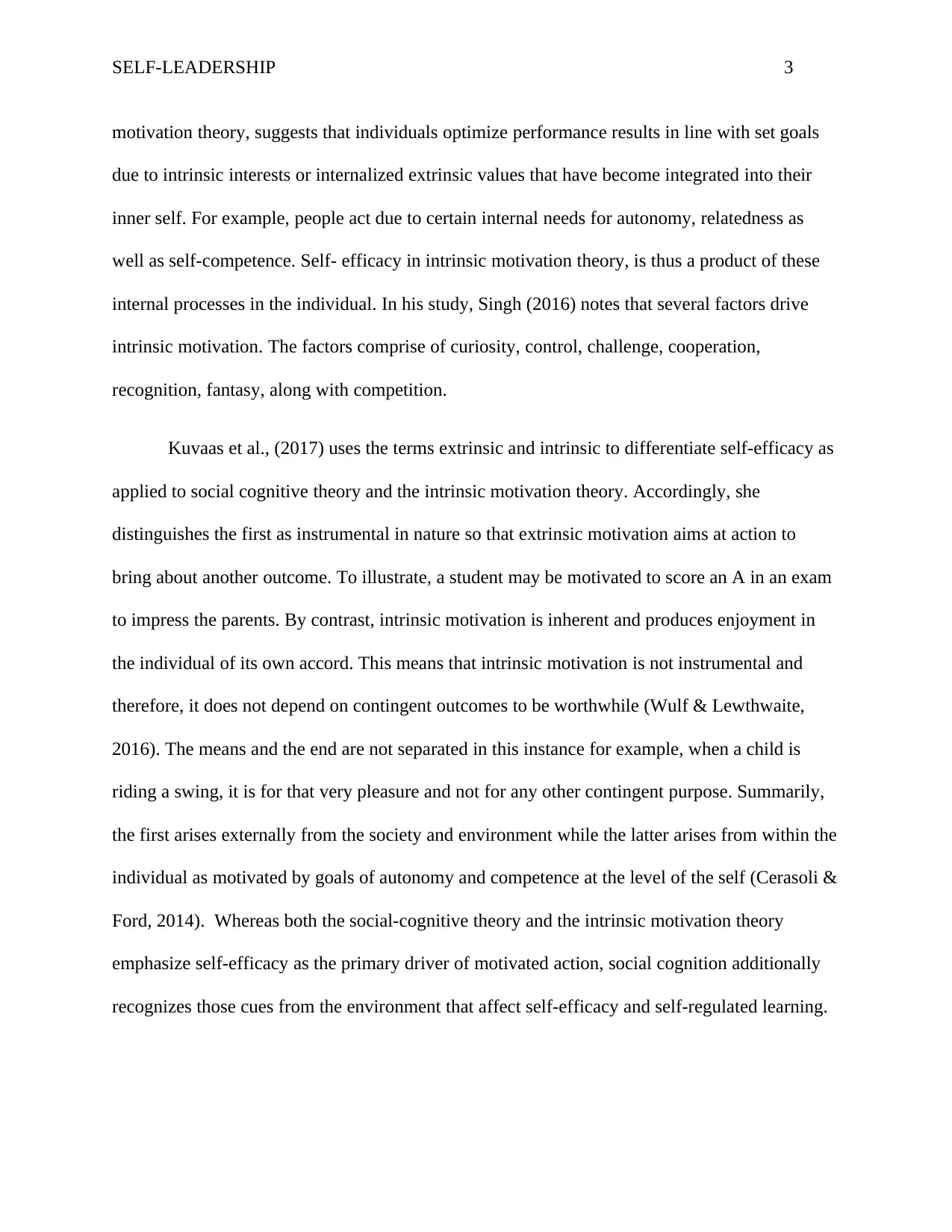
SELF-LEADERSHIP 3
motivation theory, suggests that individuals optimize performance results in line with set goals
due to intrinsic interests or internalized extrinsic values that have become integrated into their
inner self. For example, people act due to certain internal needs for autonomy, relatedness as
well as self-competence. Self- efficacy in intrinsic motivation theory, is thus a product of these
internal processes in the individual. In his study, Singh (2016) notes that several factors drive
intrinsic motivation. The factors comprise of curiosity, control, challenge, cooperation,
recognition, fantasy, along with competition.
Kuvaas et al., (2017) uses the terms extrinsic and intrinsic to differentiate self-efficacy as
applied to social cognitive theory and the intrinsic motivation theory. Accordingly, she
distinguishes the first as instrumental in nature so that extrinsic motivation aims at action to
bring about another outcome. To illustrate, a student may be motivated to score an A in an exam
to impress the parents. By contrast, intrinsic motivation is inherent and produces enjoyment in
the individual of its own accord. This means that intrinsic motivation is not instrumental and
therefore, it does not depend on contingent outcomes to be worthwhile (Wulf & Lewthwaite,
2016). The means and the end are not separated in this instance for example, when a child is
riding a swing, it is for that very pleasure and not for any other contingent purpose. Summarily,
the first arises externally from the society and environment while the latter arises from within the
individual as motivated by goals of autonomy and competence at the level of the self (Cerasoli &
Ford, 2014). Whereas both the social-cognitive theory and the intrinsic motivation theory
emphasize self‐efficacy as the primary driver of motivated action, social cognition additionally
recognizes those cues from the environment that affect self‐efficacy and self‐regulated learning.
motivation theory, suggests that individuals optimize performance results in line with set goals
due to intrinsic interests or internalized extrinsic values that have become integrated into their
inner self. For example, people act due to certain internal needs for autonomy, relatedness as
well as self-competence. Self- efficacy in intrinsic motivation theory, is thus a product of these
internal processes in the individual. In his study, Singh (2016) notes that several factors drive
intrinsic motivation. The factors comprise of curiosity, control, challenge, cooperation,
recognition, fantasy, along with competition.
Kuvaas et al., (2017) uses the terms extrinsic and intrinsic to differentiate self-efficacy as
applied to social cognitive theory and the intrinsic motivation theory. Accordingly, she
distinguishes the first as instrumental in nature so that extrinsic motivation aims at action to
bring about another outcome. To illustrate, a student may be motivated to score an A in an exam
to impress the parents. By contrast, intrinsic motivation is inherent and produces enjoyment in
the individual of its own accord. This means that intrinsic motivation is not instrumental and
therefore, it does not depend on contingent outcomes to be worthwhile (Wulf & Lewthwaite,
2016). The means and the end are not separated in this instance for example, when a child is
riding a swing, it is for that very pleasure and not for any other contingent purpose. Summarily,
the first arises externally from the society and environment while the latter arises from within the
individual as motivated by goals of autonomy and competence at the level of the self (Cerasoli &
Ford, 2014). Whereas both the social-cognitive theory and the intrinsic motivation theory
emphasize self‐efficacy as the primary driver of motivated action, social cognition additionally
recognizes those cues from the environment that affect self‐efficacy and self‐regulated learning.
⊘ This is a preview!⊘
Do you want full access?
Subscribe today to unlock all pages.

Trusted by 1+ million students worldwide
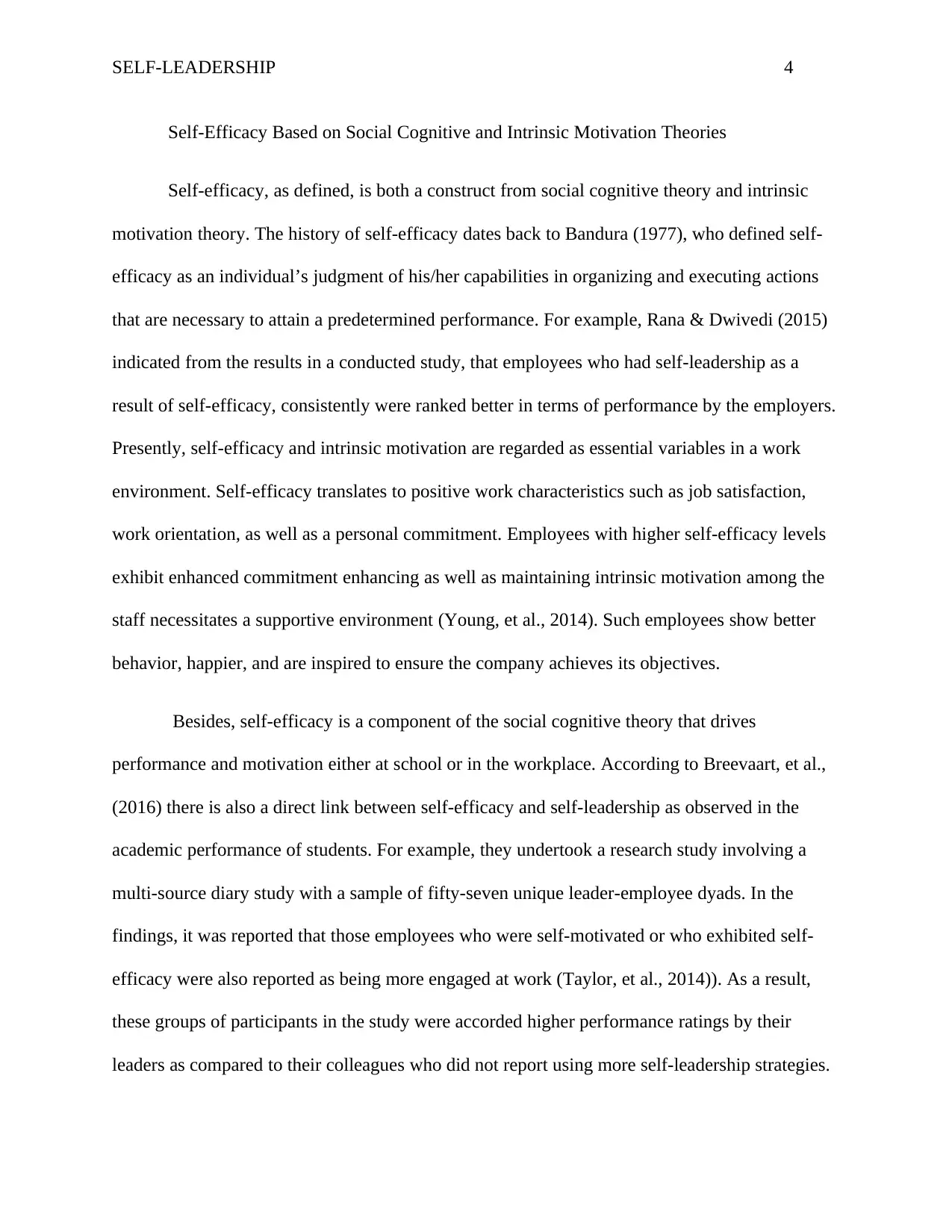
SELF-LEADERSHIP 4
Self-Efficacy Based on Social Cognitive and Intrinsic Motivation Theories
Self-efficacy, as defined, is both a construct from social cognitive theory and intrinsic
motivation theory. The history of self-efficacy dates back to Bandura (1977), who defined self-
efficacy as an individual’s judgment of his/her capabilities in organizing and executing actions
that are necessary to attain a predetermined performance. For example, Rana & Dwivedi (2015)
indicated from the results in a conducted study, that employees who had self-leadership as a
result of self-efficacy, consistently were ranked better in terms of performance by the employers.
Presently, self-efficacy and intrinsic motivation are regarded as essential variables in a work
environment. Self-efficacy translates to positive work characteristics such as job satisfaction,
work orientation, as well as a personal commitment. Employees with higher self-efficacy levels
exhibit enhanced commitment enhancing as well as maintaining intrinsic motivation among the
staff necessitates a supportive environment (Young, et al., 2014). Such employees show better
behavior, happier, and are inspired to ensure the company achieves its objectives.
Besides, self-efficacy is a component of the social cognitive theory that drives
performance and motivation either at school or in the workplace. According to Breevaart, et al.,
(2016) there is also a direct link between self-efficacy and self-leadership as observed in the
academic performance of students. For example, they undertook a research study involving a
multi-source diary study with a sample of fifty-seven unique leader-employee dyads. In the
findings, it was reported that those employees who were self-motivated or who exhibited self-
efficacy were also reported as being more engaged at work (Taylor, et al., 2014)). As a result,
these groups of participants in the study were accorded higher performance ratings by their
leaders as compared to their colleagues who did not report using more self-leadership strategies.
Self-Efficacy Based on Social Cognitive and Intrinsic Motivation Theories
Self-efficacy, as defined, is both a construct from social cognitive theory and intrinsic
motivation theory. The history of self-efficacy dates back to Bandura (1977), who defined self-
efficacy as an individual’s judgment of his/her capabilities in organizing and executing actions
that are necessary to attain a predetermined performance. For example, Rana & Dwivedi (2015)
indicated from the results in a conducted study, that employees who had self-leadership as a
result of self-efficacy, consistently were ranked better in terms of performance by the employers.
Presently, self-efficacy and intrinsic motivation are regarded as essential variables in a work
environment. Self-efficacy translates to positive work characteristics such as job satisfaction,
work orientation, as well as a personal commitment. Employees with higher self-efficacy levels
exhibit enhanced commitment enhancing as well as maintaining intrinsic motivation among the
staff necessitates a supportive environment (Young, et al., 2014). Such employees show better
behavior, happier, and are inspired to ensure the company achieves its objectives.
Besides, self-efficacy is a component of the social cognitive theory that drives
performance and motivation either at school or in the workplace. According to Breevaart, et al.,
(2016) there is also a direct link between self-efficacy and self-leadership as observed in the
academic performance of students. For example, they undertook a research study involving a
multi-source diary study with a sample of fifty-seven unique leader-employee dyads. In the
findings, it was reported that those employees who were self-motivated or who exhibited self-
efficacy were also reported as being more engaged at work (Taylor, et al., 2014)). As a result,
these groups of participants in the study were accorded higher performance ratings by their
leaders as compared to their colleagues who did not report using more self-leadership strategies.
Paraphrase This Document
Need a fresh take? Get an instant paraphrase of this document with our AI Paraphraser
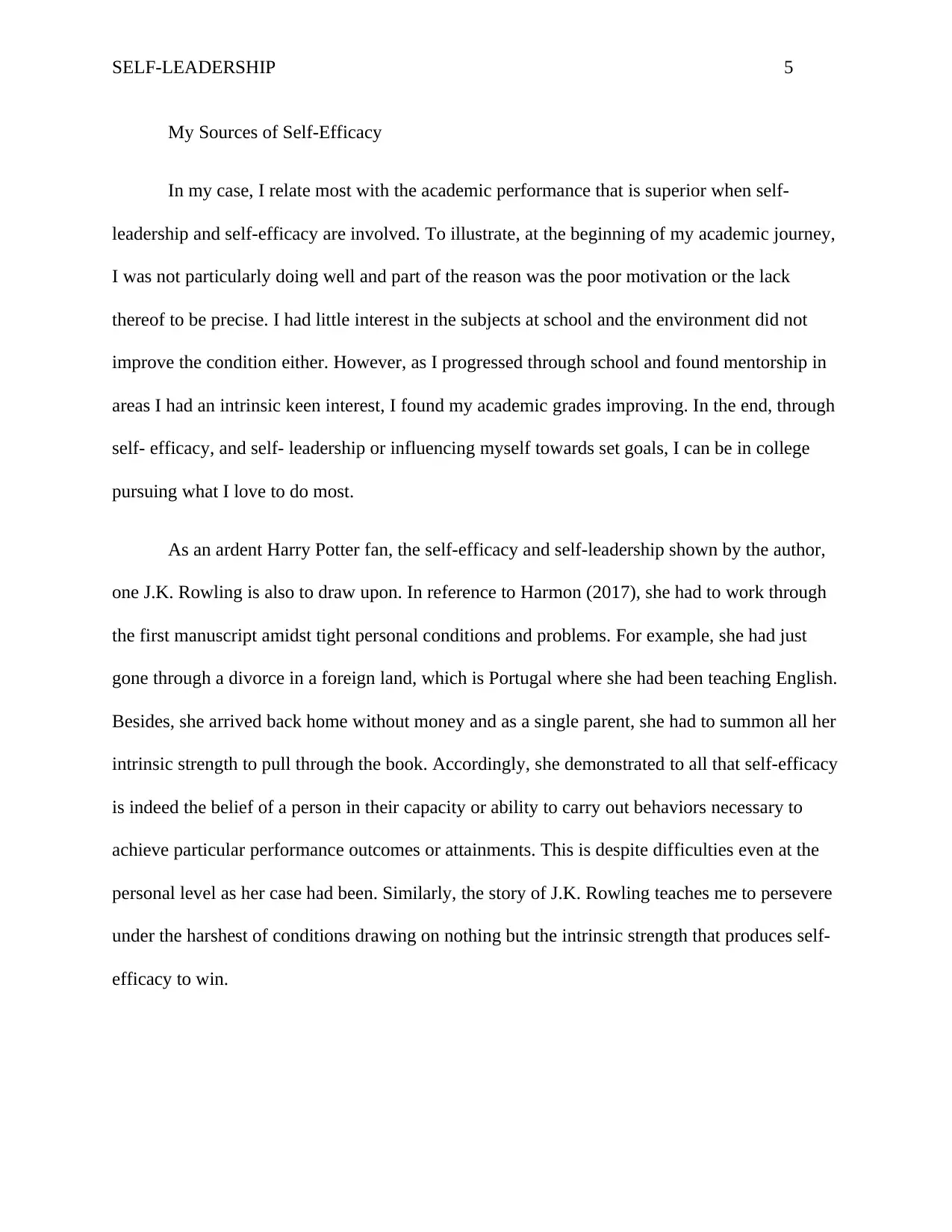
SELF-LEADERSHIP 5
My Sources of Self-Efficacy
In my case, I relate most with the academic performance that is superior when self-
leadership and self-efficacy are involved. To illustrate, at the beginning of my academic journey,
I was not particularly doing well and part of the reason was the poor motivation or the lack
thereof to be precise. I had little interest in the subjects at school and the environment did not
improve the condition either. However, as I progressed through school and found mentorship in
areas I had an intrinsic keen interest, I found my academic grades improving. In the end, through
self- efficacy, and self- leadership or influencing myself towards set goals, I can be in college
pursuing what I love to do most.
As an ardent Harry Potter fan, the self-efficacy and self-leadership shown by the author,
one J.K. Rowling is also to draw upon. In reference to Harmon (2017), she had to work through
the first manuscript amidst tight personal conditions and problems. For example, she had just
gone through a divorce in a foreign land, which is Portugal where she had been teaching English.
Besides, she arrived back home without money and as a single parent, she had to summon all her
intrinsic strength to pull through the book. Accordingly, she demonstrated to all that self-efficacy
is indeed the belief of a person in their capacity or ability to carry out behaviors necessary to
achieve particular performance outcomes or attainments. This is despite difficulties even at the
personal level as her case had been. Similarly, the story of J.K. Rowling teaches me to persevere
under the harshest of conditions drawing on nothing but the intrinsic strength that produces self-
efficacy to win.
My Sources of Self-Efficacy
In my case, I relate most with the academic performance that is superior when self-
leadership and self-efficacy are involved. To illustrate, at the beginning of my academic journey,
I was not particularly doing well and part of the reason was the poor motivation or the lack
thereof to be precise. I had little interest in the subjects at school and the environment did not
improve the condition either. However, as I progressed through school and found mentorship in
areas I had an intrinsic keen interest, I found my academic grades improving. In the end, through
self- efficacy, and self- leadership or influencing myself towards set goals, I can be in college
pursuing what I love to do most.
As an ardent Harry Potter fan, the self-efficacy and self-leadership shown by the author,
one J.K. Rowling is also to draw upon. In reference to Harmon (2017), she had to work through
the first manuscript amidst tight personal conditions and problems. For example, she had just
gone through a divorce in a foreign land, which is Portugal where she had been teaching English.
Besides, she arrived back home without money and as a single parent, she had to summon all her
intrinsic strength to pull through the book. Accordingly, she demonstrated to all that self-efficacy
is indeed the belief of a person in their capacity or ability to carry out behaviors necessary to
achieve particular performance outcomes or attainments. This is despite difficulties even at the
personal level as her case had been. Similarly, the story of J.K. Rowling teaches me to persevere
under the harshest of conditions drawing on nothing but the intrinsic strength that produces self-
efficacy to win.
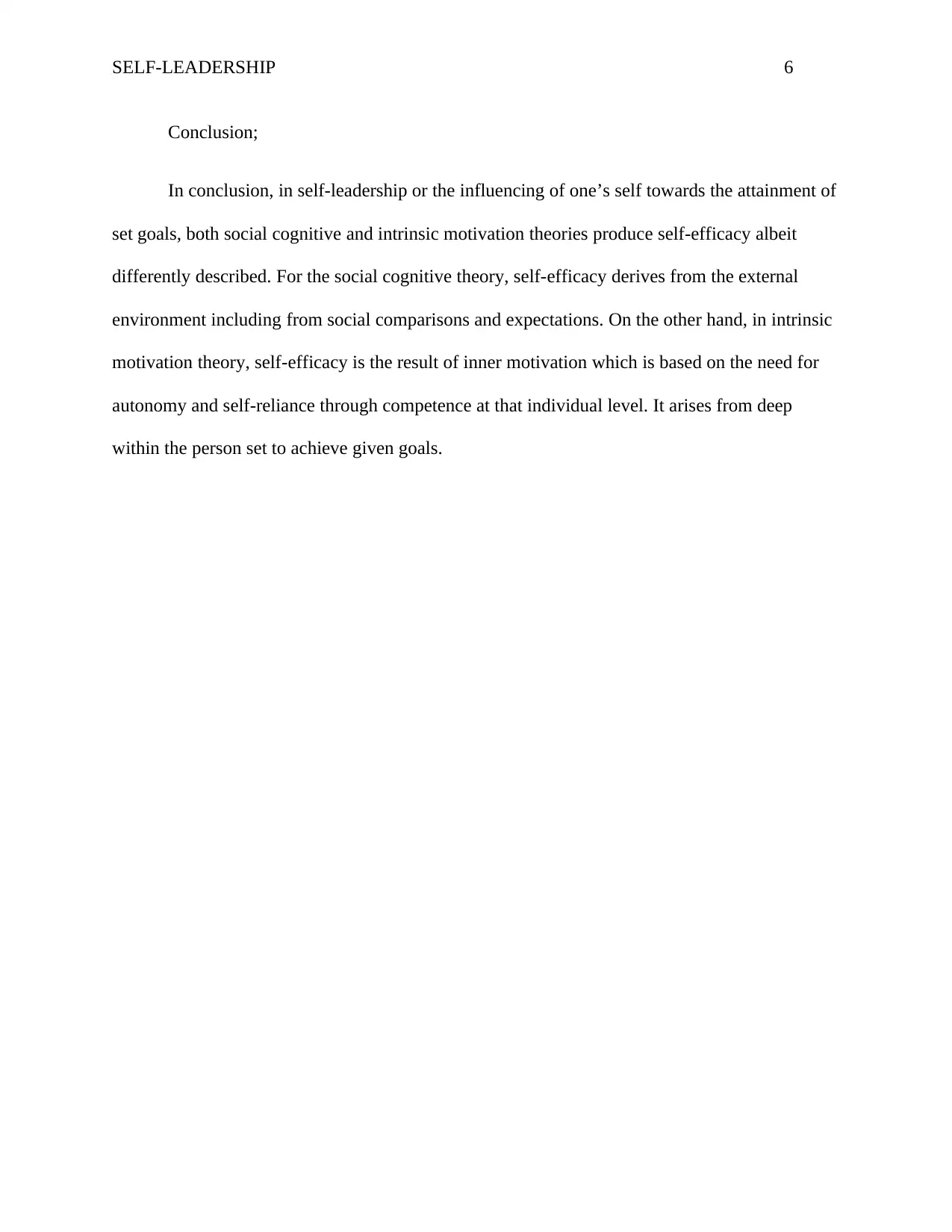
SELF-LEADERSHIP 6
Conclusion;
In conclusion, in self-leadership or the influencing of one’s self towards the attainment of
set goals, both social cognitive and intrinsic motivation theories produce self-efficacy albeit
differently described. For the social cognitive theory, self-efficacy derives from the external
environment including from social comparisons and expectations. On the other hand, in intrinsic
motivation theory, self-efficacy is the result of inner motivation which is based on the need for
autonomy and self-reliance through competence at that individual level. It arises from deep
within the person set to achieve given goals.
Conclusion;
In conclusion, in self-leadership or the influencing of one’s self towards the attainment of
set goals, both social cognitive and intrinsic motivation theories produce self-efficacy albeit
differently described. For the social cognitive theory, self-efficacy derives from the external
environment including from social comparisons and expectations. On the other hand, in intrinsic
motivation theory, self-efficacy is the result of inner motivation which is based on the need for
autonomy and self-reliance through competence at that individual level. It arises from deep
within the person set to achieve given goals.
⊘ This is a preview!⊘
Do you want full access?
Subscribe today to unlock all pages.

Trusted by 1+ million students worldwide
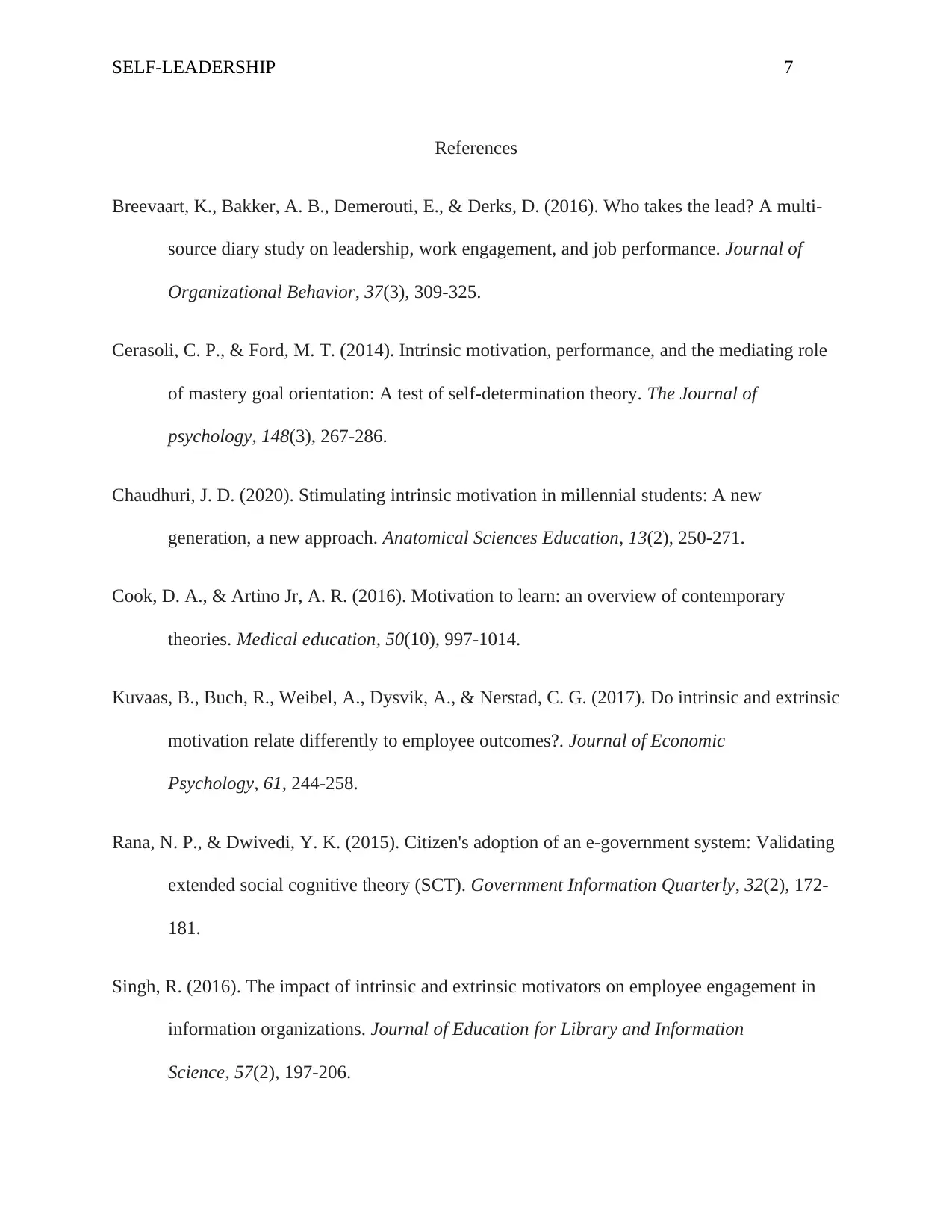
SELF-LEADERSHIP 7
References
Breevaart, K., Bakker, A. B., Demerouti, E., & Derks, D. (2016). Who takes the lead? A multi‐
source diary study on leadership, work engagement, and job performance. Journal of
Organizational Behavior, 37(3), 309-325.
Cerasoli, C. P., & Ford, M. T. (2014). Intrinsic motivation, performance, and the mediating role
of mastery goal orientation: A test of self-determination theory. The Journal of
psychology, 148(3), 267-286.
Chaudhuri, J. D. (2020). Stimulating intrinsic motivation in millennial students: A new
generation, a new approach. Anatomical Sciences Education, 13(2), 250-271.
Cook, D. A., & Artino Jr, A. R. (2016). Motivation to learn: an overview of contemporary
theories. Medical education, 50(10), 997-1014.
Kuvaas, B., Buch, R., Weibel, A., Dysvik, A., & Nerstad, C. G. (2017). Do intrinsic and extrinsic
motivation relate differently to employee outcomes?. Journal of Economic
Psychology, 61, 244-258.
Rana, N. P., & Dwivedi, Y. K. (2015). Citizen's adoption of an e-government system: Validating
extended social cognitive theory (SCT). Government Information Quarterly, 32(2), 172-
181.
Singh, R. (2016). The impact of intrinsic and extrinsic motivators on employee engagement in
information organizations. Journal of Education for Library and Information
Science, 57(2), 197-206.
References
Breevaart, K., Bakker, A. B., Demerouti, E., & Derks, D. (2016). Who takes the lead? A multi‐
source diary study on leadership, work engagement, and job performance. Journal of
Organizational Behavior, 37(3), 309-325.
Cerasoli, C. P., & Ford, M. T. (2014). Intrinsic motivation, performance, and the mediating role
of mastery goal orientation: A test of self-determination theory. The Journal of
psychology, 148(3), 267-286.
Chaudhuri, J. D. (2020). Stimulating intrinsic motivation in millennial students: A new
generation, a new approach. Anatomical Sciences Education, 13(2), 250-271.
Cook, D. A., & Artino Jr, A. R. (2016). Motivation to learn: an overview of contemporary
theories. Medical education, 50(10), 997-1014.
Kuvaas, B., Buch, R., Weibel, A., Dysvik, A., & Nerstad, C. G. (2017). Do intrinsic and extrinsic
motivation relate differently to employee outcomes?. Journal of Economic
Psychology, 61, 244-258.
Rana, N. P., & Dwivedi, Y. K. (2015). Citizen's adoption of an e-government system: Validating
extended social cognitive theory (SCT). Government Information Quarterly, 32(2), 172-
181.
Singh, R. (2016). The impact of intrinsic and extrinsic motivators on employee engagement in
information organizations. Journal of Education for Library and Information
Science, 57(2), 197-206.
Paraphrase This Document
Need a fresh take? Get an instant paraphrase of this document with our AI Paraphraser
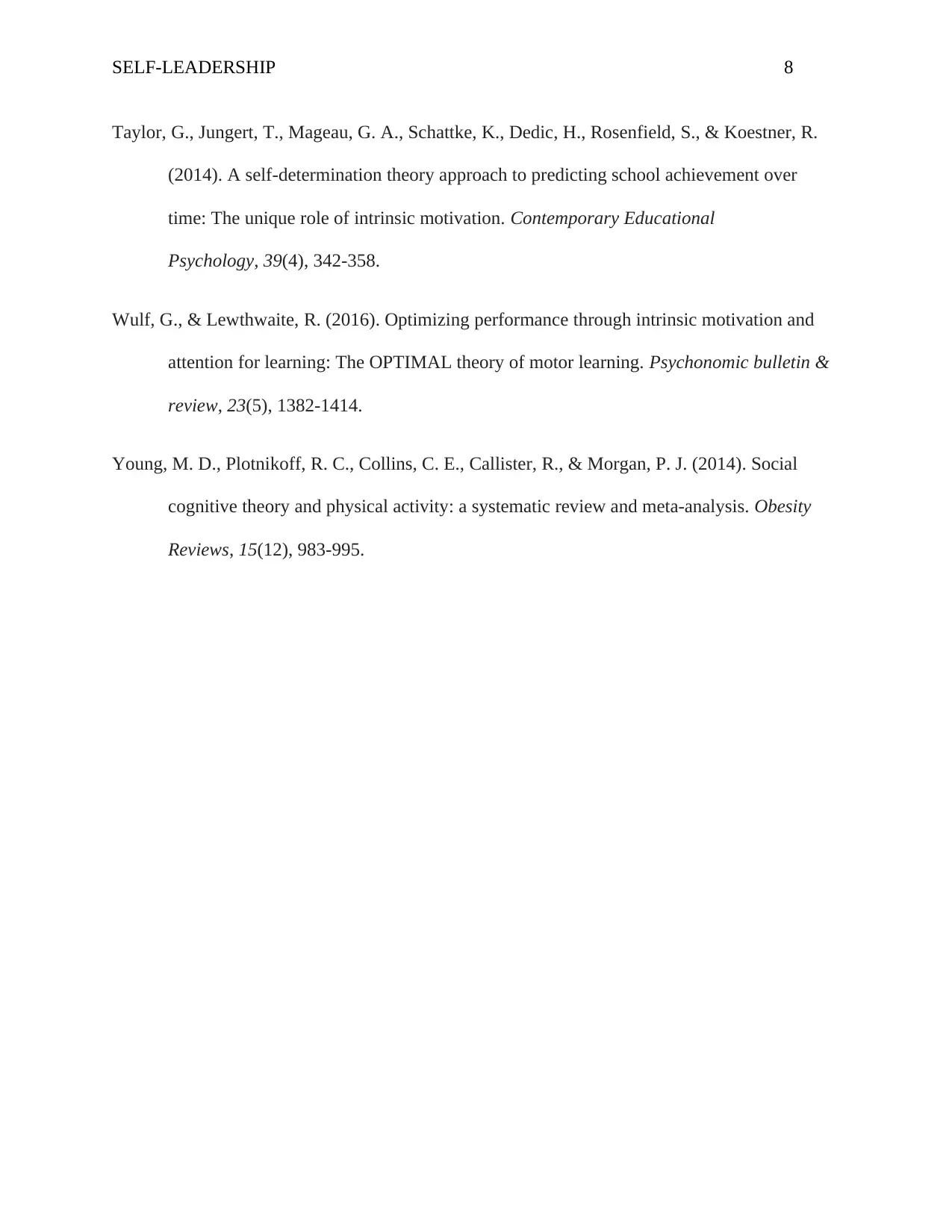
SELF-LEADERSHIP 8
Taylor, G., Jungert, T., Mageau, G. A., Schattke, K., Dedic, H., Rosenfield, S., & Koestner, R.
(2014). A self-determination theory approach to predicting school achievement over
time: The unique role of intrinsic motivation. Contemporary Educational
Psychology, 39(4), 342-358.
Wulf, G., & Lewthwaite, R. (2016). Optimizing performance through intrinsic motivation and
attention for learning: The OPTIMAL theory of motor learning. Psychonomic bulletin &
review, 23(5), 1382-1414.
Young, M. D., Plotnikoff, R. C., Collins, C. E., Callister, R., & Morgan, P. J. (2014). Social
cognitive theory and physical activity: a systematic review and meta‐analysis. Obesity
Reviews, 15(12), 983-995.
Taylor, G., Jungert, T., Mageau, G. A., Schattke, K., Dedic, H., Rosenfield, S., & Koestner, R.
(2014). A self-determination theory approach to predicting school achievement over
time: The unique role of intrinsic motivation. Contemporary Educational
Psychology, 39(4), 342-358.
Wulf, G., & Lewthwaite, R. (2016). Optimizing performance through intrinsic motivation and
attention for learning: The OPTIMAL theory of motor learning. Psychonomic bulletin &
review, 23(5), 1382-1414.
Young, M. D., Plotnikoff, R. C., Collins, C. E., Callister, R., & Morgan, P. J. (2014). Social
cognitive theory and physical activity: a systematic review and meta‐analysis. Obesity
Reviews, 15(12), 983-995.
1 out of 8
Related Documents
Your All-in-One AI-Powered Toolkit for Academic Success.
+13062052269
info@desklib.com
Available 24*7 on WhatsApp / Email
![[object Object]](/_next/static/media/star-bottom.7253800d.svg)
Unlock your academic potential
Copyright © 2020–2026 A2Z Services. All Rights Reserved. Developed and managed by ZUCOL.





